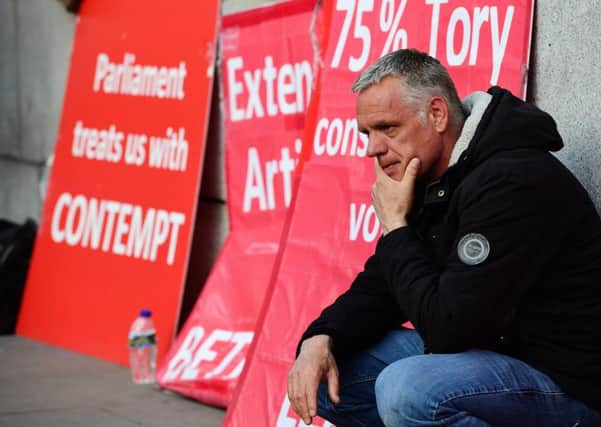Brian Wilson: Groupies of ‘elitist’ EU need to realise it must change


Once upon a time, I reported football matches for a Sunday paper with an early deadline. These were the days before lap-tops when communication was achieved by shouting down the phone from press-box to copy-taker.
The routine demanded filing half my copy at half-time with another slab midway through the second-half then a top and tail on the final whistle. If, next morning, it read coherently, a minor work of art had been achieved.
Advertisement
Hide AdAdvertisement
Hide AdIf, on the other hand, everything happened in the last five minutes, the work of art could be extremely lop-sided. At this moment, it seems a bit like observing Brexit. Nothing much, despite all the mini-dramas, has changed in the past three years.
Will there be a last-minute winner? Will the game drag on to an inconclusive outcome? Will there be extra-time and maybe even the dreaded replay? By the time the history of Brexit is written, it may yet have gone to a ‘deal or no deal’ penalty shoot-out.
At least the past few days have offered the satisfaction of confirming Messrs Johnson, Rees-Mogg and cabal as the charlatans they undoubtedly are. All the bloated denunciations of “the deal” have been subordinated to ambition. Suddenly, they could live with it to get rid of the Prime Minister. If the Tories reward these chancers, then hell mend them.
Without doubt, Theresa May is the primary author of her own misfortunes. Whenever she had a choice, she turned to the right, trying to appease the unappeasable and putting herself in hock to the ultimate nay-sayers, the DUP.
Even the olive branches she offered Labour MPs in her peroration yesterday would have made dismissal of the deal more difficult if they had come weeks or months ago and she might not be facing this dismal departure with no grounds for trust in what follows. But too little, too inflexible, too late.
A couple of weeks ago, I described indicative voting as “more like a parlour game than a means of decision-making”. MPs seemed anxious to confirm this by not giving a majority to any of the options on offer. Even Ken Clarke’s amendment on a Customs Union was voted down. “Compromise” is much spoken of but little practiced.
We hear endlessly about “the will of the Scottish/British people” but such generalities conceal much more complexity than polarising politicians can afford to admit. This, oddly enough, is confirmed by polling commissioned by Angus Robertson’s new outfit, which could hardly have been delighted by what it uncovered.
Asked to place their commitment to Scottish independence or the Union on a scale of one to ten, only 24 per cent put the former at 10 with 40 per cent for the latter. In other words, when the question ceased to be binary, the response became far more nuanced than the headline.
Advertisement
Hide AdAdvertisement
Hide AdLeave aside the Scottish question since the immediate relevance of this approach is to Brexit. I guess that voters’ degree of commitment, one way or another, would break down along similar lines. Only a minority are wedded to an absolutist outcome which is why respectful compromise would have been applauded rather than derided.
And why should there not be compromise? One of the by-products of this debate has been to push some “remain” politicians into performing as groupies for the EU, as if it was an undisputed font of enlightenment which delivers only largesse and progressive outcomes. I voted “remain” and wish the whole thing had never arisen but find the arrogance of these effusions, and the disdain for anyone who disputes them, almost as annoying as the Europhobe ravings. If Mr Robertson applied his voting scale to my EU-enthusiasm, I would rate myself as a seven.
Listen to Ireland’s President Michael O’Higgins, an intellectual of the left, calling this week for “changes in the institutional architecture” of the EU to reflect “the social, the economic, the cultural and the ethical”. The EU, he said, still operates on an elitist assumption that “there is no area of life in which the optimum circumstances cannot be provided by the market place”.
Is there anyone in our own politics who either knows what he is talking about or cares; far less being able and willing to articulate it, for fear of being shouted down?
